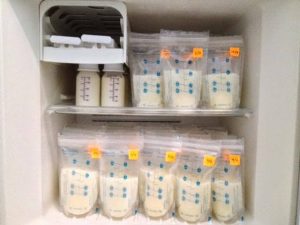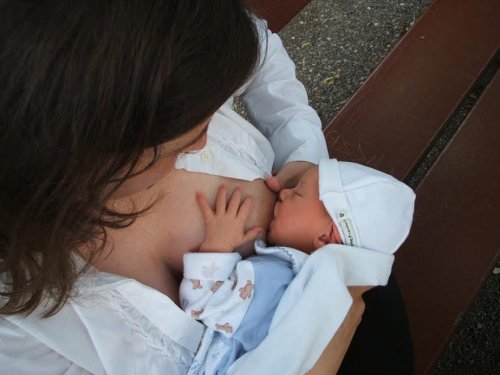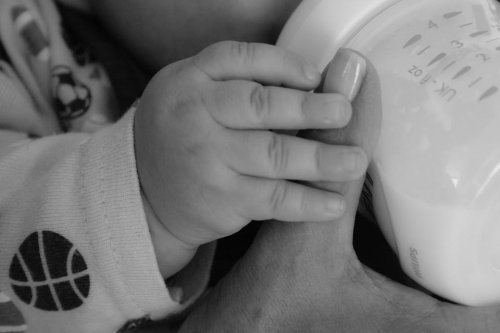Secrets to Storing Your Own Breast Milk

A domestic breast milk bank refers to your personal supply of stored breast milk that you have extracted and and saved for future use. It is a practice recommended by specialists and promoters of exclusive breastfeeding.
In the last decade, interest has sparked in various countries regarding the correct method for storing breast milk in the refrigerator. The reason is that many mothers have to go back to their professional activities in the months following birth. This is a growing tendency.
A mother’s first concern is to provide the best nourishment for her child. And when it comes to nourishment, there is nothing better for our babies than nursing.
However, sometimes our activities out of the home work against our desire to breastfeed. Sometimes we don’t have enough time. When that’s the case, a little planning ahead will help us reach our goal of providing natural breast milk for our babies
How long can breast milk be stored?

A mother’s milk is rich in a great variety of vitamins, fats and immunological agents. All of these components work together for your child’s healthy development. It’s important to guarantee the preservation of these properties when saving your milk.
You should know that breast milk maintains its quality at room temperature for up to 7 hours.
Breast milk that is correctly frozen can be saved for up to 12 months.
If you want to store your milk to be used the next day, you should place it in the refrigerator. Breast milk can be stored safely in the refrigerator for up to one week.
However, if you don’t think you’re going to use the milk that soon, we recommend freezing it. Be sure to store it at a temperature below 32 degrees. This will allow you to safely store your milk for 7-12 months.
You might be asking yourself how to know how long your milk has been in the freezer or refrigerator. Don’t worry. You can label the storage bags or containers with the date of extraction. This will allow you to be sure the milk you give your baby is safe.
How should breast milk be stored?
You can find small bags in the pharmacy that are made to store 4 to 8 ounces of breast milk. However, if you want to save larger amounts, you can use plastic or glass containers. Make sure the containers are sterilized and food-safe, and that they can be hermetically sealed.
The best tips for extracting your milk
The best way to stimulate breastmilk production is with your baby’s own suckling. This has been scientifically proven. Therefore, we recommend that you extract your milk right while you are nursing.
But how is this done?
It’s much easier than you think. All you need to do is attach your breast pump to one of your breasts while you baby nurses from the other. The pump can be manual or electric.
Mothers who have put this technique into practice swear by it. They claim that you can extract a larger amount in less time. If you pump while your baby is sleeping, you will need more time to collect the same amount of milk.
How much milk should you set aside?
That depends completely on your daily schedule and the needs of your baby. Newborn babies tend to feed every 2 or 3 hours. You should be sure to save enough milk for your baby to continue this pattern while you are out. The amount your baby drinks at each interval will depend on their age and demand.
When should you begin building up your milk bank?

The sooner the better! You should begin storing your milk as soon as you have a little to spare. This will make you more comfortable when the day comes that you need to leave your baby to someone else’s care.
Remember that your breast milk bank is your best back-up to nursing your baby directly. It will allow you to keep giving your baby the best source of nourishment even when you are out.
Creating your own breast milk bank right from the start is an excellent idea. Why? During your baby’s first days of life, your mammary glands produce a special substance called colostrum.
Breast milk specialists claim that colostrum is liquid gold. This isn’t simply because colostrum is yellow, but also because of the marvelous properties it possesses.
For example, it contains enzymes and lactobacillus acidophilus. These components strengthen the development of your baby’s intestinal tract. They also facilitate digestion.
Saving colostrum will help you get through your baby’s first colds and fevers.
Thanks to its high antibody content, colostrum can act as an antibiotic against infection. It can also serve as the best vaccine against the common colds that babies experience during their first year.
Plan the creation of your breast milk bank before the birth of your baby. Your breast milk supply should be your best ally; not a race against time. Don’t forget to enjoy the fact that you are giving your baby the best source of nutrition in the world.
This text is provided for informational purposes only and does not replace consultation with a professional. If in doubt, consult your specialist.
